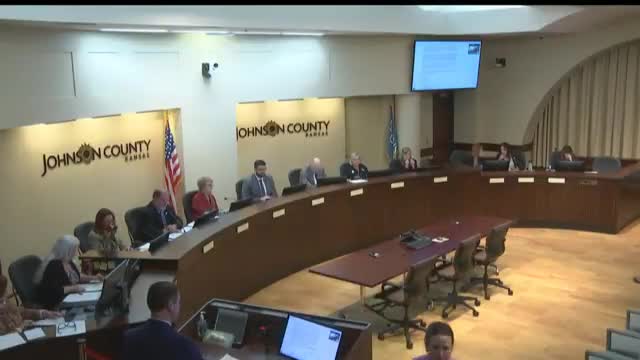Johnson County accepts $300,000 Kansas Fights Addiction grant to expand care for uninsured and underinsured residents
Get AI-powered insights, summaries, and transcripts
Subscribe
Summary
County mental-health officials won a $300,000 Kansas Fights Addiction Act grant to fund integrated services for uninsured and underinsured people with substance use disorders; commissioners authorized reallocation of fund-balance reserves to allow expenditure.
The Johnson County Board of County Commissioners voted unanimously Jan. 9 to accept a $300,000 Kansas Fights Addiction (KFA) grant and to authorize reallocation of fund-balance reserves for fiscal year 2025 so the county can spend the award.
The grant will be administered by the county mental health department to expand integrated care for uninsured and underinsured people with substance use disorders and co-occurring mental illness, county staff said.
The county’s presentation said the award will support an existing Diagnosis and Outpatient Program (DDOP). “This will help to reinforce those efforts and bring this under an umbrella that will be a little bit more comprehensive and integrated forms of care,” Tanner Fortney of Johnson County Mental Health told the board. Fortney said services supported by the grant include community psychiatric supportive treatment, medication assistance, transportation to appointments and placement in sober-living houses.
The grant is for one year and, Fortney said, does not create new county positions. “There are no positions that are associated with this particular request. This will all be done through the 11 FTEs that we currently have on our DDOP team,” Fortney said. He added that the funds will reimburse services provided to individuals who otherwise would be uncompensated and can be used to buy additional medication, transportation and sober-living placements.
A member of the public asked several procedural and eligibility questions during public comment, including whether the grant requires a 50/50 match and how the county defines “underinsured.” Ben Hobert of Westwood Hills asked whether the county would be spending $300,000 from reserves in addition to the grant and sought counts and eligibility rules. “Does the grant require fifty-fifty cost sharing? … Is the total being spent then $600,000 – $300,000 from reserves and $300,000 from the grant?” Hobert asked.
Fortney clarified the reallocation request is a budgeting action that authorizes the county to expend the grant money; it does not mean the county is spending its reserves in addition to the grant. “If we receive a grant and we're going to spend 1 penny more than what we have budgeted for in our overall budget, we have to come before the board and we have to ask you to reclassify reserve authority,” he said.
Commissioners pressed staff on eligibility and metrics. Fortney said the grant language allows the county to serve both uninsured clients and clients whose insurance does not cover services the county provides (which staff described as “underinsured”). “There’s not a restriction that says if someone has insurance that doesn’t cover something … they’re not eligible,” he said. Fortney also said the department uses standard clinical measures (for example, AUDIT and PHQ-9) and tracks treatment completion for clients who remain in county care.
Commissioners said they want future reporting on outcomes and counts of people served under the grant. Commissioner Hanslick moved approval; Commissioner Myers seconded. The motion carried 7–0.
County staff said the KFA program is one of several episodic funding sources the mental health department pursues and that the county will continue to apply for state and federal grants to support behavioral-health care.
Ending: The board scheduled a broader discussion of opioid settlement planning and related funding at a Committee of the Whole meeting tentatively set for March 13, when commissioners said they expect to review longer-term allocation strategies.
